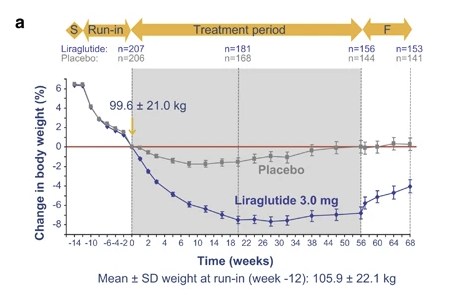Today I have a cool little study to share with you. Or at least I think it’s cool. This is coming from the guy that reads research articles on his lunch hour for ‘fun.’
Anyways, we are going to discuss Saxenda again. However, the study we are looking at is a little different compared to the usual ones I review. Generally, a group of people is recruited, and that group gets split up – half goes on X drug, and the other half goes on a placebo. Then we see what kind of results appear at the end of a given time frame.
Today’s study by Wadden and friends (PMID: 23812094) is unique – they recruited a group of people, but, before they put them on Saxenda or a placebo, they had them lose ≥5% of their baseline body weight. The purpose? They wanted to see if Saxenda helped with maintaining the initial weight loss and whether it led to even more weight being lost!
What we know
 Saxenda and study-aside, we know that losing 5 to 10% or even more of your baseline body weight is possible through lifestyle modifications, like diet and exercise. This loss can also provide significant health benefits. However, this loss and any benefits gained are quickly attenuated by weight regain.
Saxenda and study-aside, we know that losing 5 to 10% or even more of your baseline body weight is possible through lifestyle modifications, like diet and exercise. This loss can also provide significant health benefits. However, this loss and any benefits gained are quickly attenuated by weight regain.
Many individuals will gain 35 to 40% of the weight loss over the next 12 months. This is where the common saying in the Obesity space comes from: “the best way to gain 5 lbs is by losing 20 lbs.” So, we continually look at strategies and methods that will help to bridge this gap and lead to longer-term weight maintenance.
Regular behavior and lifestyle counseling have been shown as one method to improve weight maintenance for up to 2.5 years. And to shamelessly promote my program, this is what we support our clients with. You can book a session with yours truly right here.
Another option that is being considered and may have been proven in this study was using pharmaceutical agents. Let’s dive into it.
The SCALE Maintenance Randomized Study
 For this specific study, Wadden and friends looked at individuals who had obesity as defined by a BMI >30 or >27 and had two additional weight-related conditions, such as high blood pressure.
For this specific study, Wadden and friends looked at individuals who had obesity as defined by a BMI >30 or >27 and had two additional weight-related conditions, such as high blood pressure.
They recruited 422 people and initiated them on a low-calorie diet which consisted of using food, and three daily meal replacement shakes aiming for 1,200 to 1,400 calories/day. They had weekly interactions with a nutritionist to support adherence and were encouraged to engage in regular activity.
I can’t say I agree with the above dietary strategies for the Average Joe, but the authors had a goal of getting people to the 5% weight loss cut-off so they could then randomize them and get half of the participants on Saxenda 3mg daily and the other half on a placebo. This process took anywhere from 4 to 12 weeks.
Once participants were randomized to their respective groups, they were then switched to a more reasonable dietary approach. Aiming for a 500 calorie/day deficit, otherwise known as aiming to eat 500 calories less than what they were burning. Meal replacement shakes were no longer used; they were still provided counseling sessions and encouraged to stay active. All of this occurred over a 56-week period.
Okay, that’s the boring stuff. Let’s talk about results, and lucky for us, the authors provided a wonderful graphical representation of the results.
The Results
 As we can see, there was the ‘Run-in’ period – here, participants lost on average 6% or 6.3 kg (13.9 lbs) of their baseline body weight.
As we can see, there was the ‘Run-in’ period – here, participants lost on average 6% or 6.3 kg (13.9 lbs) of their baseline body weight.
Then we have a ‘Treatment’ period – 212 people were put on Saxenda and titrated to a dose of 3 mg daily, and 210 people were put on an identical placebo.
Both groups continued to lose weight. The Saxenda group lost substantially more (another 6.2%) and maintained those losses. The placebo group lost another 0.2% before starting to gain the weight back at the end. 81.4% of the Saxenda group vs. 48.9% of the placebo group maintained the 5% initial weight loss.
Interestingly, in the Saxenda group, 50.5% of participants lost another 5% or more weight after the initial ‘Run-in’ period, and 26.1% lost another 10% or more weight! In total, +25% of participants potentially lost >15% of their body weight from start to finish! This is compared to the placebo group, where only 21.8% lost 5% or more, and 6.3% lost 10% or more.
Similar to the other Saxenda study I recently reviewed, the authors here performed another 12-week off-drug period, designated as ‘F’ in the table. We can see there was some weight regain following the discontinuation of Saxenda, and weight gain may have continued had this period been longer based on the upward trend. Once again highlighting, like my need for caffeine, many people will need these medications for life.
If we look at the Saxenda group from the very start of the study before the ‘Run-in’ period to the end of the ‘Treatment’ period, they lost on average a total of ~12 kg (26.5 lbs) vs. ~6 kg (13.2 lbs) in the placebo group.
Not too shabby – especially if we compare it to the results seen in the SCALE trial I reviewed, where participants out the gate were put on Saxenda or placebo with no ‘Run-in’ period. The Saxenda group lost 8% (8.4 kg) vs. 2.6% (2.8 kg) in the placebo group.
Now it is very hard to make any generalizations or recommendations as the sample sizes were vastly different, 3,700 vs. 400 participants, and there were some overall study differences, BUT perhaps losing some weight initially without medication and then adding medication may lead to better overall weight-loss results.
This is purely speculative, and we would need an actual trial of sufficient size to determine if that is the case. Which you can bet I am going to take a look through the literature to see if such a trial exists, and if it doesn’t, well, I might just have to see about running that trial myself.
So another fascinating trial and hopefully an equally fascinating article by moi!
References:
PMID: 23812094
—
If you enjoyed this, please feel free to share it with your friends, and don’t forget to subscribe to my mailing list so that you don’t miss any of my new articles.
And as always, don’t forget that small tweaks lead to massive peaks.
Until next time!
 Dr. Dan
Dr. Dan
Follow me on social media for regular updates – @TheOfficialDrDan
Subscribe to my newsletter for a heads-up on all new content.
Sharing is caring! Here’s the link for social, email, and even text – https://healthevolved.co/lose-weight-take-saxenda/
If you need some coaching support on your weight management journey, you can book a consultation with me to see if you’d be a good fit for our program.
Questions or comments? Please send them my way on our Contact Us page!


 Dr. Dan
Dr. Dan



